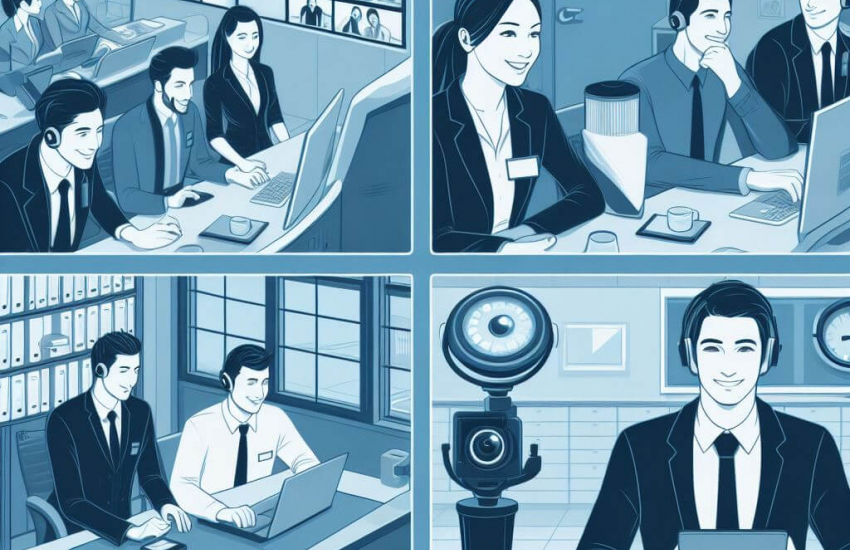Legalities of Video Surveillance in the Workplace
Workplaces tend to have lots of visitors from people from all walks of life. They may also have to manage the transportation, storage, and management of goods. With many valuable products, the well-being of the workers, and the assurance of quality customer service, workplace surveillance is a standard thing now.
However, simply setting up cameras anywhere the business owner wants is a no-go. One must implement a clear-cut plan to comply with the state and federal laws. The primary factor to consider here is employees’ privacy.
If your next goal is to invest in workplace surveillance, this article can help you with the planning and things to consider.
Legal Boundaries

In the USA, an employer must think about state and federal laws before even starting with their surveillance strategy. It means that they will either have to go through the state pages and other relevant sites to learn the legal codes or ask their legal advisor to help them.
You don’t want to get to the wrong side of the law regarding employee privacy breaches, as the penalties are usually not pleasant, depending on the state. Let’s check some of the common laws you should be aware of first-
Laws About Privacy
According to federal laws, an employer can’t monitor or record any employee in places or times with a reasonable expectation of privacy. However, the concept of privacy and what constitutes a reasonable expectation of privacy differ by state.
The only exception to this federal law is when the employer has a legitimate business interest outweighing the worker’s expectation of privacy. In the end, the court will provide the verdict. So, it is better to only keep surveillance in places where it is mandatory and not private or semi-private.
One-Party or All-Party Consent
Whether a state is one-party or all-party consent is another essential factor to check. There are currently 12 all-party consent states in the US. They are-
Washington, California, Michigan, Illinois, Montana, Pennsylvania, Florida, New Hampshire, Maryland, Connecticut, Delaware, and Massachusetts. In these states, you need the consent of all parties getting recorded or monitored. When you put up a sign near the entrance, and someone enters the premises afterward, they are legally giving consent to it.
Only Orlando is a mixed consent state. The rest of the states support one-party consent, whereas as long as one party consents to the surveillance, it is okay. So, now you can understand the importance of notifications. Don’t forget or neglect to put up the sign even in a one-party consent state to stay out of trouble.
Unique Laws in States or Counties
Statewise, you may also have to abide by many unique laws regarding surveillance. They may also depend on the specific business you run. For example, cannabis businesses and some others must always require surveillance to keep the goods and selling points under watch. So, occasionally visiting your official state page or website containing legal codes will be ideal.
Employee Privacy Rights

As we mentioned, the definition of privacy rights differs by state. So, even if one state allows recording the lounge room in a workplace, that doesn’t mean another will. Some have it way stricter, while many have it a bit loose.
For example, California requires the employer not to record or surveil any worker in private places such as bathrooms, locker rooms, changing rooms, etc. West Virginia and some other states also forbid the authorities to record or monitor workers when the latter is in an area assigned for the personal or health comfort of employees. So, the staff room, lounges, and even common rooms may fall within it. Meanwhile, there is no formal privacy right constituted in the state of Oklahoma yet.
In the end, all states are trying to keep a balance between privacy and security in the workplace. Even after these actions, the workers in places are not pleased by the law and believe that employees deserve better privacy in their workplace.
When any case is brought to the court, it usually checks if the employee violated workers’ privacy and whether there was a valid reason behind that. The case usually goes in the employees’ favor if they notice any privacy breach.
Implementation Best Practices
Now that the topics of privacy concerns and law are out of the way let’s talk about how to establish suitable surveillance measures in your workplace to ensure respect and responsibility. You may have to consider several factors to stay within the law and ethical limits.
Let’s check out some of the things to consider during your surveillance system planning within your business premises-
- Differentiate between private, semi-private, and public or shared spaces. Avoid installing any cameras or recording devices in private places. Also, avoid semi-private areas such as lounge rooms or areas around a cooler unless it is absolutely necessary. Only proceed to keep your public spaces within the coverage of your camera view.
- While choosing the correct location of cameras and the angle at which they will be pointed, ensure that it doesn’t cover any major part of the private areas. Even if the cameras are in a public space, they may still capture parts of public areas, which you must avoid.
- Put up notification signs near the entrance stating that the premises are being monitored with a surveillance system. The law in many states will also want you to use any specific language on the sign besides English if at least 5% of the visitors or workers speak that language.
- Make sure to dispose of the footage after a specific time. Possession of security camera footage is limited in most states. For example, California only allows employers to keep the video data for up to 90 calendar days.
- Keep the access to the data captured by the surveillance system restricted. Also, keep a detailed document of who is accessing the footage, which you can use as a chain of custody if any crime occurs in your workplace.
- Some places may be legally allowed to monitor or record, but it may still be disrespectful to your workers or customers. It is better not to monitor those places unless it is needed for the sake of a more trusted business.
- Check your state laws for any rules regarding surveillance in your specific business and abide by them.
- When running a multi-state business, each fraction of your business, premises, subsidiaries, and properties must maintain the surveillance laws of their respective location (county and state). Many multi-state or international businesses employ legal advisors to handle the legal boundaries of a foreign state or nation.
Staying on the Right Side of the Law

The job is not done after an influential and lawful surveillance system and management integration. As you may know, the laws and regulations are changing, so should your strategies and methods. In order to cope with the alteration of the law regarding surveillance, the following are some points you can remember and exercise-
Regular Evaluation
You need to ensure that everything in your security system is complying with the legal codes of the state and federal agencies. The same applies to other parts and sectors of your business, not just security.
Because of that, it is ideal to set up an hour each week to evaluate any changes in law. You can discuss the following during the brief meeting-
- Whether there were any changes in the law regarding employee rights and surveillance measures in the workplace.
- Whether the changes in law correlate with the existing management and strategy that you have integrated into your businesses. If not, then what changes are there to make to make it comply?
- Check whether you or your employees need to learn or practice something from then on.
Update the Employee Handbook Yearly
While it may not be too related to surveillance, you should still update the employee handbook each year per any law changes. Get your external counsel or legal advisor to review the handbook before you hand them out. After all, the changes in workplace surveillance law may also affect the workers. As such, a regular update to company policies is necessary.
Necessary Training Sessions
Under specific conditions, you may have to establish training sessions for your management team, security guards, or other workers for any changes to the law. For example, if the new law requires that a particular part of your business must be under surveillance at all times, your security team needs to adapt and adhere to that.
Changes in the Equipment
Often, old surveillance equipment may not be up to the task when dealing with laws that require you to surveil any point with cameras at any specific minimum resolution. So, you may need to make changes and upgrade your surveillance hardware or software to adhere to the legality aspects.
FAQs
Are CCTV Cameras Legal in the Workplace?
Yes, CCTV cameras or other surveillance systems are legal in the workplace as long as they don’t breach the privacy of the workers, customers, and clients. The employers must also obtain the necessary consent from everyone by putting up signs and adhering to different state and federal laws.
What Do People Think About Workplace Surveillance?
After a survey, it was revealed that most workers (8 out of 10) do not favor workplace surveillance, claiming that it breaches their privacy rights. 66% of interviewees feel like they are not trusted by the authorities when being monitored by digital security. Meanwhile, 77% of employees think workplace surveillance is a form of spying.
How Can Employees Be Friends with Workplace Surveillance?
The best practice the owners and authorities of businesses can perform in order to make the workers comfortable under surveillance is to adhere strictly to the law. They should clarify to the employees that their privacy isn’t being breached, as no private areas are being monitored.
They also should inform the workers that the footage gets deleted after a specific time, and the purpose of surveillance is mainly for the safety of the workers and goods and for keeping track of the transactions and sales.
Conclusion
Workplace surveillance is a very significant part of its security system, albeit the laws surrounding it can be tricky. An effective way to get through the maze of legal codes is to ensure regular evaluation, employ a legal advisor, and abide by workers’ privacy rights.


